President Prepares for Executive Takeover
Obama Says Congress “Encouraged Our Enemies”

![]()
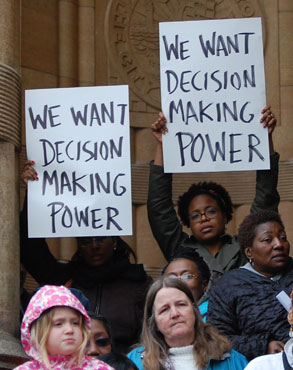
President Prepares for Executive Takeover
• Obama Says Congress “Encouraged Our Enemies”
• Funding Law Resolves Nothing
• For Your Information: U.S. Federal Government Debt
President Prepares for Executive Takeover
Obama Says Congress “Encouraged Our Enemies”
President Obama spoke October 17 about the law passed October 16 to end the government shutdown and raise the debt ceiling. In speaking about Congress, he said their actions had “encouraged our enemies and emboldened competitors,” and that Congress cannot treat government “like an enemy or purposely” make it work worse. He also expressed the concern of the rulers that existing governance has lost legitimacy and their hope that people will follow Obama in how it “must change.” Taken together these are indications that after threatening executive action this time, next time Obama may will take it. At the very least, he is preparing the ground to brand Congresspeople as enemies.
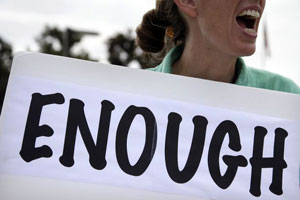 Speaking to the broad anger among the people with governance at this time, he said, “We know that the American people’s frustration with what goes on in this town has never been higher. That’s not a surprise that the American people are completely fed up with Washington.” Saying there were no winners in this latest fight, he quoted a Wall Street credit rating agency identifying the problem as “repeated brinkmanship.”
Speaking to the broad anger among the people with governance at this time, he said, “We know that the American people’s frustration with what goes on in this town has never been higher. That’s not a surprise that the American people are completely fed up with Washington.” Saying there were no winners in this latest fight, he quoted a Wall Street credit rating agency identifying the problem as “repeated brinkmanship.”
He also elaborated that he considers the consequences of the showdown serious. Saying it set the economy back, he added, “Probably nothing has done more damage to America’s credibility in the world, our standing with other countries, than the spectacle that we’ve seen these past several weeks. It’s encouraged our enemies. It’s emboldened our competitors. And it’s depressed our friends who look to us for steady leadership.”
Then he specifically addresses Congress saying: “To all my friends in Congress, understand that how business is done in this town has to change. Because we’ve all got a lot of work to do on behalf of the American people — and that includes the hard work of regaining their trust. Our system of self-government doesn’t function without it.” Clearly there is concern here by the ruling circles that people are drawing the conclusion that those in power are not fit to govern, they are not legitimate and need to be removed. Obama is trying to contend with both the government dysfunction and lack of confidence by usurping yet more power — the power of the purse — while defending such action as necessary to ensure “work on behalf of the American people” takes place.
Obama also repeats the content of his previous remarks, about extremes in both parties. “We all know that we have divided government right now. There’s a lot of noise out there, and the pressure from the extremes affect how a lot of members of Congress see the day-to-day work that’s supposed to be done here.” On October 2 he put it this way: “If we get in the habit where a few folks, an extremist wing of one party, whether it’s Democrats or Republicans — are allowed to extort concessions — based on a threat of undermining the full faith and credit of the United States, then any president who comes after me, not just me — will find themselves unable to govern effectively. And that’s not something that I’m going to allow to happen.”
In his speech October 17, he goes on to say that differences in Congress are acceptable and that “We can debate those differences vigorously, passionately, in good faith, through the normal democratic process…We shouldn’t fail to act on areas that we do agree or could agree just because we don’t think it’s good politics; just because the extremes in our party don’t like the word ‘compromise.’ I will look for willing partners wherever I can to get important work done.”
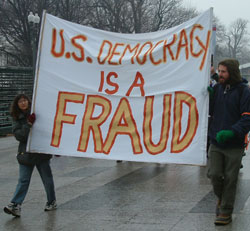 He adds, “So let’s work together to make government work better, instead of treating it like an enemy or purposely making it work worse. That’s not what the founders of this nation envisioned when they gave us the gift of self-government…Don’t break what our predecessors spent over two centuries building. That’s not being faithful to what this country is about.”
He adds, “So let’s work together to make government work better, instead of treating it like an enemy or purposely making it work worse. That’s not what the founders of this nation envisioned when they gave us the gift of self-government…Don’t break what our predecessors spent over two centuries building. That’s not being faithful to what this country is about.”
He then concludes emphasizing, “Those of us who have the privilege to serve this country have an obligation to do our job as best we can. We come from different parties, but we are Americans first. And that’s why disagreement cannot mean dysfunction. It can’t degenerate into hatred. The American people’s hopes and dreams are what matters, not ours. Our obligations are to them. Our regard for them compels us all, Democrats and Republicans, to cooperate, and compromise, and act in the best interests of our nation — one nation, under God, indivisible with liberty and justice for all.”
Potential for Congresspeople to be Branded Enemies
Taken together, Obama is putting forward to Congress that failure to cooperate and compromise in supporting presidential rule is not the American way, is not putting America first. Those who work with him to “make government better” are upholding their obligation. Those who do not, whether Democrat or Republican, are “extremists” who “encourage our enemies,” and “embolden our competitors.” These “extremists” are treating government like an enemy and this he will not allow. It must change. And while government may be “divided,” there can only be one nation, indivisible, which means these “extremists” cannot be tolerated. He is also speaking more generally — those among the people who do not cooperate and compromise are also not acting in the “best interests of our nation,” and will be criminalized as extremists aiding the enemy.
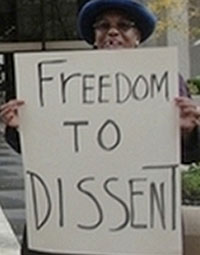 Obama is providing justification for more criminalization of dissent and specifically presidential action to seize the power of the purse in the name of defending the interests of the nation and stopping Congress from “encouraging enemies.” He is also advancing the notion that the only way to restore confidence in government is for the president to act, otherwise this dysfunction and “repeated brinkmanship” will persist. He is putting forward to the vying factions among the rulers that he, and those he represents, are prepared to act to by targeting “extremists” in Congress as the means to preserve the nation, the union. Congresspeople could potentially be branded as those aiding the enemy, or acting against the “best interests of the nation.” Certainly, the power of the purse must be removed from such hands and placed in those of the president.
Obama is providing justification for more criminalization of dissent and specifically presidential action to seize the power of the purse in the name of defending the interests of the nation and stopping Congress from “encouraging enemies.” He is also advancing the notion that the only way to restore confidence in government is for the president to act, otherwise this dysfunction and “repeated brinkmanship” will persist. He is putting forward to the vying factions among the rulers that he, and those he represents, are prepared to act to by targeting “extremists” in Congress as the means to preserve the nation, the union. Congresspeople could potentially be branded as those aiding the enemy, or acting against the “best interests of the nation.” Certainly, the power of the purse must be removed from such hands and placed in those of the president.
It is a dangerous, backward path and one that could give rise to openly violent conflicts within the ruling circles while diverting the struggles of the peoples into defending Obama. It is a path meant to divert the growing demand across the country for changes in government that favor the people, not those now in power. These demands include ending all U.S. wars, increasing funding for social programs, and a modern electoral process that increases the role of the public. Advancing these demands means refusing to submit to the direction Obama is putting forward by stepping up the fight for the rights of all, abroad and at home. Defending rights is the way forward, not choosing sides among the rulers.
[TOP]
 The law ending the government shutdown and the showdown over the debt ceiling does nothing to resolve the on-going legitimacy crisis of government. The shutdown itself and refusal by Congress to pass a budget has only made more people reach the conclusion that those in power now are unfit to govern. Their actions, their governance, are not legitimate. This is confirmed not only by broad demands, demonstrations and petitions for a budget that defends rights, but also by recent polls that indicate most people feel all those currently in Congress should be removed and a new Congress established. Their actions are not legitimate and do not serve the public interest.
The law ending the government shutdown and the showdown over the debt ceiling does nothing to resolve the on-going legitimacy crisis of government. The shutdown itself and refusal by Congress to pass a budget has only made more people reach the conclusion that those in power now are unfit to govern. Their actions, their governance, are not legitimate. This is confirmed not only by broad demands, demonstrations and petitions for a budget that defends rights, but also by recent polls that indicate most people feel all those currently in Congress should be removed and a new Congress established. Their actions are not legitimate and do not serve the public interest.
Congress remains dysfunctional and evidence indicates that it cannot be fixed — the pieces cannot be put back together again. The political parties do not function as parties but rather as individuals and various vying factions, each with their own backing and electoral machinery. Obama’s machinery, for example, belongs to him and is loyal to him, not the Democratic Party. It will undoubtedly be in play, as he decides, in 2014 and 2016.
As well, previous methods of resolving conflict and passing legislation, such as “pork barrel” funding, handing out committee appointments and Congressional leaders enforcing party discipline, are also finished. This latest crisis fully demonstrated this reality.
Further, the powers of Congress usurped by the President, involving not only waging wars but also torture, assassinations, indefinite detention, drones, spying, emergency measures, and more cannot be retrieved. Indeed, indications are that Obama is still prepared to take executive action to take over the power of the purse if Congress once again fails to pass a budget and raise the debt ceiling next spring.
Defend and Expand Role of the Public in Governance
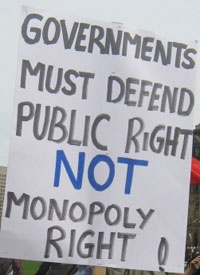 The legitimacy crisis of government, as a public institution with social responsibilities to the public, is sharpening. This law, known as the Continuing Appropriations Act, 2014 has done nothing to convince the public that institutions like Congress will function. To the contrary, most are rightly concerned that yet another showdown is in the making.
The legitimacy crisis of government, as a public institution with social responsibilities to the public, is sharpening. This law, known as the Continuing Appropriations Act, 2014 has done nothing to convince the public that institutions like Congress will function. To the contrary, most are rightly concerned that yet another showdown is in the making.
The law funds government until January 15. It increased the debt ceiling enough to last until February 7. The Treasury Department again has some maneuvering room — such as not funding federal pensions — so that March is the likely time for another showdown. According to reports there is also some ability for Obama to act to suspend the debt ceiling, with Congress being able to over-ride such action. This would be a significant usurping of power if it is the case. The full language of the bill has not yet been posted so this issue requires further investigation. Either way, the likelihood of another showdown remains.
According to reports, Congress will also establish a special budget committee, with representatives from both the House and Senate, to come up with budget proposals by December 15. This is supposed to allow Congress to debate the proposals and pass a budget by January 15. That is the date when the next round of automatic across-the-board spending cuts take place.
These large, automatic cuts were mandated by the crisis in 2011, described then as the “fiscal cliff.” The threat of them was supposed to be so drastic that it would force Congress to pass a budget. Instead, Congress failed to do so and these cuts, known as the sequester, have been implemented. Their main features are to force workers to pay for a crisis they did not create, while guaranteeing full payments of debts to the financiers. The attacks on rights include workers taking pay cuts in the form of forced unpaid days off (furloughs), cuts in funding to vital social programs like those for women and children, and more.
While Congress is again establishing a special committee to make proposals for a new budget, there is no evidence that it will succeed. The dysfunction of Congress is even greater now than in 2011. It is also not clear if the work of this committee will be public or if any of the usual public hearings on budget matters will take place. As with other features of Congress, it is likely that the role of the public will continue to be restricted, while private interests, like the financiers, meet with Obama and individual members of Congress and succeed in grabbing yet more of the public treasury. All of which further raises the question why should such illegitimate governance continue?
It is clear that the old way of doings things is finished. The old machinery in place for resolving conflict within the ruling circles no longer functions. This includes the fact that the parties, as political parties, representing contending interests among the rulers are finished. It is not just the Republicans who are fighting among themselves. The same is true among the Democrats. This will no doubt reveal itself more as demands for more cuts to social programs, especially Social Security and Medicare are made by Obama and others.
[TOP]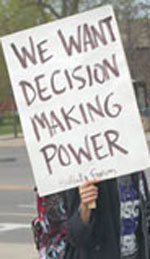 There is an alternative that favors the people, which is political empowerment of the people so that government of, by and for the people is a reality, not a phrase. The ruling circles, in rejecting the necessity of the times for modern political arrangements that empower the people themselves to govern and decide cannot resolve the crisis, cannot restore legitimacy. Their solutions, as indicated by the Obama presidency, are greater and greater concentration of powers in the Office of the President and executive impunity to act against rule of law abroad and at home. Their solutions are to further restrict the role of the public, including increasingly eliminating the powers of elected legislatures and any space for the public to have a say. This makes the fight for expanding the role of the public, at all levels, important. Public hearings, public expressions of demands, a broad public fight for the people’s budget and rights, are all means to advance the legitimate role of the public in governance and counter the illegitimacy of those now in power.
There is an alternative that favors the people, which is political empowerment of the people so that government of, by and for the people is a reality, not a phrase. The ruling circles, in rejecting the necessity of the times for modern political arrangements that empower the people themselves to govern and decide cannot resolve the crisis, cannot restore legitimacy. Their solutions, as indicated by the Obama presidency, are greater and greater concentration of powers in the Office of the President and executive impunity to act against rule of law abroad and at home. Their solutions are to further restrict the role of the public, including increasingly eliminating the powers of elected legislatures and any space for the public to have a say. This makes the fight for expanding the role of the public, at all levels, important. Public hearings, public expressions of demands, a broad public fight for the people’s budget and rights, are all means to advance the legitimate role of the public in governance and counter the illegitimacy of those now in power.
U.S. Federal Government Debt
The U.S. federal government debt = $16.805 trillion
The U.S. Treasury manages the U.S. debt through its Bureau of the Public Debt.
The Bureau breaks down the debt into two main categories:
1) Intragovernmental Holdings = $4.846 trillion
Intragovernmental holdings (also known as intragovernmental debt or intragovernmental obligations) are Government Account Series (GAS) securities held by federal government trust funds, revolving funds and special funds.
(Source: U.S. Treasury)
2) Debt Held by the Public = $11.959 trillion
Debt held by the public includes federal debt held by all investors outside of the federal government, including individuals, corporations, state or local governments, the Federal Reserve, and foreign governments.
(Source: U.S. Government Accountability Office)
***
Intragovernmental Holdings = $4.846 trillion
This debt is owed to about 230 other Federal agencies.
The debt to other government agencies occurs because those agencies, such as the Social Security Trust Fund, take in more revenue from taxes than they need at the time. Instead of keeping the excess revenue in cash, the agencies buy U.S. Treasuries from which they receive interest payments (Government Account Series securities).
Main agencies holding federal government debt:
• Social Security (Social Security Trust Fund and Federal Disability Insurance Trust Fund) is the biggest single owner of national debt. This Trust Fund is referred to as general retirement money. Amount held — $2.72 trillion
• Office of Personnel Management (Federal Employees Retirement, Life Insurance, Hospital Insurance Trust Funds, including Postal Service Fund) — $1.12 trillion
• Department of Health and Human Services (Federal Supplementary Medical Insurance Trust Fund) — $69 billion
• Federal Deposit Insurance Corporation — $35 billion
• Department of Transportation (Airport and Highway Trust Fund) — $20 billion
• Department of the Treasury (Exchange Stabilization Fund) — $23 billion
• Department of Labor (Unemployment Trust Fund) — $21 billion
• Other Programs and Funds — $933 billion.
(Source: U.S. Treasury Bulletin, as of September 2012.)
***
Debt Held by the Public = $11.959 trillion
Main holders of this part of the debt:
• Foreign governments and non-U.S. investors — $5.6 trillion
• U.S. Federal Reserve — $1.66 trillion
• State and Local Governments, including their pension funds — $709.1 billion
• Mutual Funds — $864.9 billion
• Private Pension Funds — $605.2 billion
• Banks — $305.2 billion
• Insurance Companies — $259.1 billion
• U.S. Savings Bonds — $184.7 billion
• Other (individuals, government-sponsored enterprises, brokers and dealers, bank personal trusts and estates, corporate and non-corporate businesses, and other investors) — $1.14 trillion.
***
Of particular note is the 30 per cent of the total federal debt held by various pension funds including $2.72 trillion invested in U.S. Treasuries by the Social Security Trust Fund. The approximately $5.042 trillion in pension assets held in U.S. Treasuries are accounted as U.S. government debt. The pension assets are accounted as debt because the U.S. government has spent the entire amount to fund its ongoing operations.
***
Non-U.S. ownership of the U.S. Federal Debt = $5.6 trillion
This includes governments, government agencies, corporations and individuals:
• China — $1.276 trillion
• Japan — $1.108 trillion
• The Caribbean Banking Centers — $291 billion (Includes: Bahamas, Bermuda, British Virgin Islands, Cayman Islands, Netherlands Antilles and Panama)
• Oil exporting countries — $256 billion (Includes: Ecuador, Venezuela, Indonesia, Bahrain, Iran, Iraq, Kuwait, Oman, Qatar, Saudi Arabia, the United Arab Emirates, Algeria, Gabon, Libya, and Nigeria)
• Brazil — $254 billion
• Taiwan — $185.8 billion
• Switzerland — $178.2 billion
[TOP]
